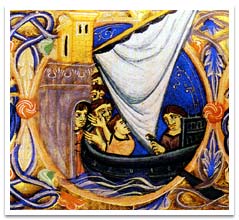Although deprived of the precious autonomy, from the point
of view of the economic and cultural life the XIII and part of the XIV
centuries resulted particularly profitable for the Amalfi people.
The commercial and productive activities increased, particularly in the
application of the technology for paper making learnt from the Arab world,
there was an increase also in the manufacture of woollen material and
in the internal part of the valley of the Canneto in 1361, one of the
oldest Ironworks in Europe was installed. In the Marine sector, the sea
compass was introduced and perfected. In the legal camp the Judge Giovanni
Augustariccio in 1274 drew up written laws the “Consuetudines Civitatis
Amalfie”. The Cardinal Pietro Capuano and his successor, the Arch-bishop
Filippo Augustariccio edified many important public and monumental buildings
that include : the Hospital of S. Maria Cruciferarum , the public schools
and a new port, also the Paradise Cloister, the Crypt of the Cathedral,
the bell-tower and they also finished the work on the Cathedral.
 |
Traslazione di S. Andrea codice del XV sec. |
The end was at hand;
The war between the Angevins and Aragons for the predomination in the
reign of Sicily not only blocked the commerce of Amalfi, but also provoked
the confiscation of the ships for military purposes.
The last straw was the competition of the Catalan Merchants when the Aragons
took over from the Angevins, and above all the terrible storm of the 24th
of November 1343. It was an exceptional storm that struck the greater
part of the Reign of Naples and at Amalfi destroyed a third of the coast
line and all the ports; Petrarch, who was travelling in the Reign of Naples
left a detailed description of the event in a famous epistle “Familiari”…
Subjected to a Feudalism from 1392 to 1583 the Duchy of Amalfi had to watch dejected and beaten the subsequent arrival of members of foreign noble families as Dukes of Amalfi, the Sanseverino, the Colonna, the Orsini and lastly the Piccolomini.